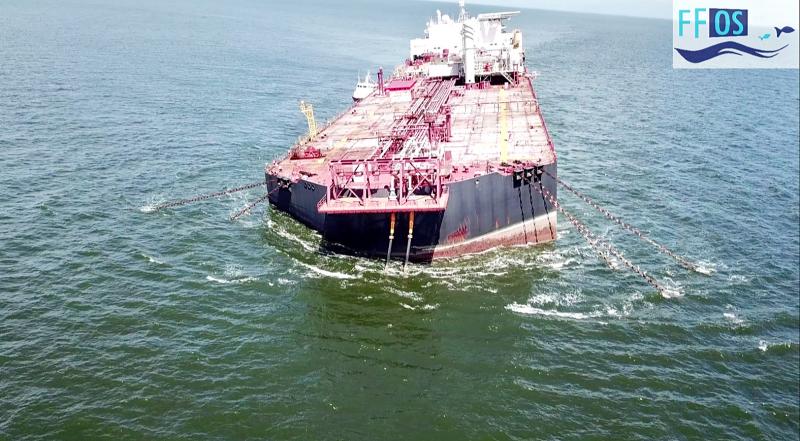Trinidad and Tobago yesterday said that a damaged oil tanker off the islands’ coast was “stable” after opposition politicians in neighboring Venezuela warned of a potential “environmental catastrophe.”
The damaged tanker, which is in the waters separating Venezuela and Trinidad and Tobago, and is owned by Venezuelan state oil company Petroleos de Venezuela SA (PDVSA), threatens to spill 1.3 million barrels of crude oil into the water.
“The ship is straight and stable without any visible risk of sinking,” Trinidadian Minister of Energy and Energy Industries Franklin Khan said during a video conference in Port of Spain, the nation’s capital.

Photo: AFP / FISHERMEN AND FRIENDS OF THE SEA / ESN
The Nabarima, anchored for several months in the Gulf of Paria, is used to store oil, but video footage shared on Friday last week by non-governmental organization Fishermen and Friends of the Sea showed it tilting.
A team of three “experts” boarded the ship on Tuesday, the day after receiving authorization from Venezuelan President Nicolas Maduro’s government, Khan said.
“There was no water ingress on the vessel visible to the team, which means the ingress reported in early September no longer exists,” Khan said.
The team reported that maintenance tasks were being carried out on the ship, such as repairing and replacing pumps and electric motors if necessary, which the experts described as “quite satisfactory,” Khan added.
Eudis Girot, a Venezuelan oil sector union leader, said that the 264m ship has had maintenance problems since 2014 which “have been ignored” by PDVSA.
Several employees of the oil firm on Monday last week reported that the tanker was listing by 8 percent while the engine room was flooded and water pumps have broken down, Girot said.
“If the oil is not transferred, and even if the Nabarima can be stabilized, we risk a permanent environmental catastrophe,” Venezuelan Legislator Robert Alcala said.
The Nabarima is owned by Petrosucre, which is majority owned by PDVSA, with Italian multinational oil and gas firm Eni holding a 26 percent share.
Venezuelan Legislator Luis Stefanelli said that PDVSA has sent two ships to try to unload the Nabarima with the vessel Icarus.
PDVSA on Tuesday started transferring the crude oil stored on the tanker, the Trinidadian government said.
However, Khan said that a larger vessel should be used, as the Icarus can only hold about a quarter of the tanker’s load.
PDVSA has not commented, but last month, it branded as “fake news” claims by environmentalists that the Nabarima was in a state of disrepair.
The operation to transfer the oil has been hindered by US sanctions against PDVSA.
Trinidad and Tobago has established a contingency plan to prevent damage in case the tanker’s cargo spills.
Oil spills are common in Venezuela due to a lack of infrastructure maintenance.
The South American country is almost entirely dependent on its oil revenue, but production has dropped from 3.2 million barrels a day over a decade ago to just 400,000 barrels.
The opposition and analysts accuse the Venezuelan government of corruption and neglect while the Maduro regime blames US sanctions.

Thousands gathered across New Zealand yesterday to celebrate the signing of the country’s founding document and some called for an end to government policies that critics say erode the rights promised to the indigenous Maori population. As the sun rose on the dawn service at Waitangi where the Treaty of Waitangi was first signed between the British Crown and Maori chiefs in 1840, some community leaders called on the government to honor promises made 185 years ago. The call was repeated at peaceful rallies that drew several hundred people later in the day. “This government is attacking tangata whenua [indigenous people] on all

RIGHTS FEARS: A protester said Beijing would use the embassy to catch and send Hong Kongers to China, while a lawmaker said Chinese agents had threatened Britons Hundreds of demonstrators on Saturday protested at a site earmarked for Beijing’s controversial new embassy in London over human rights and security concerns. The new embassy — if approved by the British government — would be the “biggest Chinese embassy in Europe,” one lawmaker said earlier. Protester Iona Boswell, a 40-year-old social worker, said there was “no need for a mega embassy here” and that she believed it would be used to facilitate the “harassment of dissidents.” China has for several years been trying to relocate its embassy, currently in the British capital’s upmarket Marylebone district, to the sprawling historic site in the

‘IMPOSSIBLE’: The authors of the study, which was published in an environment journal, said that the findings appeared grim, but that honesty is necessary for change Holding long-term global warming to 2°C — the fallback target of the Paris climate accord — is now “impossible,” according to a new analysis published by leading scientists. Led by renowned climatologist James Hansen, the paper appears in the journal Environment: Science and Policy for Sustainable Development and concludes that Earth’s climate is more sensitive to rising greenhouse gas emissions than previously thought. Compounding the crisis, Hansen and colleagues argued, is a recent decline in sunlight-blocking aerosol pollution from the shipping industry, which had been mitigating some of the warming. An ambitious climate change scenario outlined by the UN’s climate

A deluge of disinformation about a virus called hMPV is stoking anti-China sentiment across Asia and spurring unfounded concerns of renewed lockdowns, despite experts dismissing comparisons with the COVID-19 pandemic five years ago. Agence France-Presse’s fact-checkers have debunked a slew of social media posts about the usually non-fatal respiratory disease human metapneumovirus after cases rose in China. Many of these posts claimed that people were dying and that a national emergency had been declared. Garnering tens of thousands of views, some posts recycled old footage from China’s draconian lockdowns during the COVID-19 pandemic, which originated in the country in late